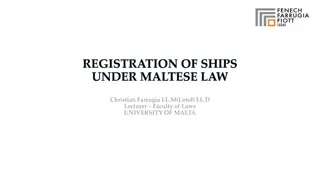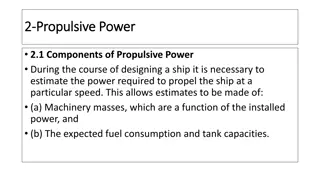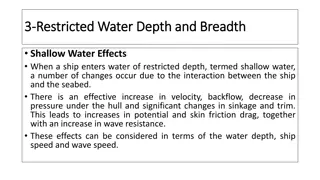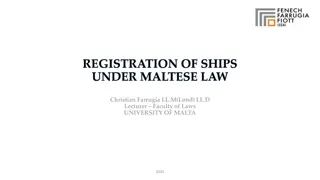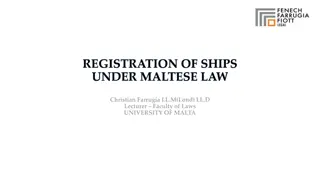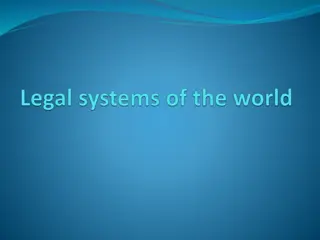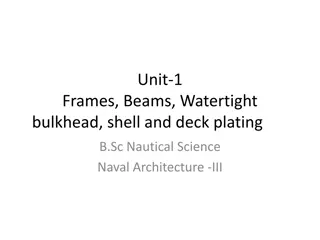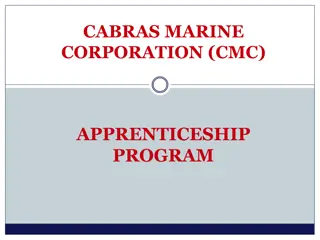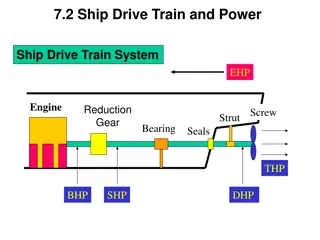Legal Aspects of Ship Nomenclature and Definition in International Law
This article discusses the complexities surrounding the classification and definition of ships in international law, focusing on various vessel types such as barge ships, drill rigs, and floating storage units. It highlights the lack of a universal definition of a ship, referencing key international conventions and their definitions to address legal uncertainties in the maritime industry related to vessels used for oil transportation and storage.
Download Presentation

Please find below an Image/Link to download the presentation.
The content on the website is provided AS IS for your information and personal use only. It may not be sold, licensed, or shared on other websites without obtaining consent from the author.If you encounter any issues during the download, it is possible that the publisher has removed the file from their server.
You are allowed to download the files provided on this website for personal or commercial use, subject to the condition that they are used lawfully. All files are the property of their respective owners.
The content on the website is provided AS IS for your information and personal use only. It may not be sold, licensed, or shared on other websites without obtaining consent from the author.
E N D
Presentation Transcript
ALMA MATER STUDIORUM UNIVERSITY OF BOLOGNA 1
The CMI Work Regarding Ship Nomenclature Guest Speaker: Dr. Massimiliano Musi PORTORO , 26-28 May 2016 2
THE PROBLEM IS A FLOATING LOG A SHIP ? ship is one of the most conspicuous examples of juridical pluriqualification of the same phenomenal element progress in science and technology multiple forms of new and peculiar types of vessel or floating units: barge ships or l.a.sh. (lighters aboard ships), b.a.cat. (barges aboard catamaran), jack up drill rig,mobile drilling units,drilling rigs,drillships,offshore platform,offloading vessels, FSOs and FSUs (Floating Storage and OffloadingVessel and Floating Storage Units) implication applicable discipline 3
FSOs and FSUs These vessels are anchored to the seabed Definition: units operating at anchor in open sea, and are used in the oil industry for the storage of oil after extraction from a marine field. Serious gap in the law Need for all stakeholders to have a better knowledge of the risks and the forms of legal protection What to do 4
THE DISCIPLINE OF THE INTERNATIONAL CONVENTIONS No universal definition of ship in international law Ship means seaborne constructed or adapted for the carriage of oil in bulk as cargo, provided that a ship capable of carrying oil and other cargoes shall be regarded as a ship only when it is actually carrying oil in bulk as cargo and during any voyage following such carriage unless it is proved that it has no residues of such carriage of oil in bulk aboard . any sea any going type vessel whatsoever and craft of CLC 1992 5
The International Convention on Civil Liability for Bunker Oil Pollution Damage, 2001: Ship means any seagoing vessel and seaborn craft, of any type whatsoever - wide range of factispecies. MARPOL Convention contains the following definition: Ship means a vessel of any type whatsoever operating in the marine environment and includes hydrofoil boats, air-cushion vehicles, submersibles, floating craft and fixed or floating platforms . Guidelines for application of MARPOL Annex 1 - Requirements to FPSOs and FSUs: Def. Ship - FPSOs / FSUs are fixed or floating platforms and are therefore included in this definition . Draft convention on off-shore mobile craft (Rio de Janeiro, September 1977), defines, the craft as any marine structure of whatever nature not permanently fixed into the sea-bed . International Convention for the Safe and Environmentally Sound Recycling of Ships, signed in Hong Kong in 2009: Ship means a vessel of any type whatsoever operating or having operated in the marine environment and includes submersibles, floating craft, floating platforms, self elevating platforms, Floating Storage Units (FSUs), and Floating Production Storage and Offloading Units (FPSOs), including a vessel stripped of equipment or being towed . International Convention for the Control and Management of Ships Ballast Water and Sediments, 2004: Ship means a vessel of any type whatsoever operating in the aquatic environment and includes submersibles, floating craft, floating platforms, FSUs and FPSOs . 6
Australian Ship Registration Act of 1981,in its latest version adopted in 2013:ship means any kind of vessel capable of navigating the high seas and includes: (a) a barge lighter or other floating vessel; (b) a structure that is able to float or be floated and is able to move or be moved as an entity from one place to another;and (c) an air-cushion vehicle,or other similar craft,used wholly or primarily in navigation by water;but does not include a vessel,structure,vehicle or craft declared by the regulations not to be a ship for the purposes of this definition (Part I Preliminary) . Merchant Shipping Act adopted by the UK in1995, which, in Part II, paragraph 12 of its Schedule 7, on the Convention on Limitation of Liability for Maritime Claims 1976, in identifying the Meaning of ship , provides that: References in the Convention and in the preceding provisions of this Part of this Schedule to a ship include references to any structure (whether completed or in course of completion) launched and intended for use in navigation as a ship or part of a ship . The Anti Fouling System Convention provides: Ship means a vessel of any type whatsoever operating in the marine environment and includes hydrofoil boats, air-cushion vehicles, submersibles, floating craft, fixed or floating platforms, floating storage units (FSUs) and floating production storage and off-loading units (FPSOs) . Convention on the International Maritime Satellite Organization (INMARSAT), 1976: Ship means a vessel of any type operating in the marine environment. It includes inter alia hydrofoil boats,air-cushion vehicles,submersibles,floating craft and platforms not permanently moored . EU level in the Commission Communication to the Parliament and the Council of 12th October 2010 ( Facing the challenge of the safety of offshore oil and gas activities ), it is stated that: MODUs are considered as seagoing vessels and their safety is subject to rules in the International Maritime Organization (IMO) Code for the Contruction and Equipment of Mobile Offshore Drilling Units (MODU Code) . EXPRESS EXCLUSION:International Convention on Salvage (London 1989):art.1 (b): Vessel means any ship or craft,or any structure capable of navigation - but art.3,entitled Platforms and drilling units ,adds: This Convention shall not apply to fixed or floating platforms or to mobile offshore drilling units when such platforms or units are on location engaged in the exploration,exploitation or production of sea-bed mineral resources . 7
THE MAIN LINES OF INTERPRETATION OF THE DOCTRINE Parameters to which the concept of ship is anchored: a) the vessel operates in the marine environment; b) the same has the ability to go to sea without being permanently moored to the seabed. May FSOs and FSUs fall within the parameters that seem to qualify a ship ? Doubts FSOs and FSUs are in a position to be only virtually suitable for the navigation, while in practice their movement is generally only contingent and, in any case, sporadic. International Chamber of Shipping and the International Group of P&I Associations:what did they say? Restrictive interpretation principle of reasonableness CLC, art. VII, first paragraph: requires that the owner of a ship registered in a contracting State has to provide insurance or other financial security to cover liability for pollution damage. The competent authorities of a considerable number of countries have issued for FSOs and FSUs a certificate attesting the conformity of the chosen insurance coverage 8
The Italian Doctrine no unified approach A) FSOs and FSUs do not have the destinatio ad navigandum necessary for them to be classified as ships B) the concept of navigation should be understood in a broader sense, to encompass the operations of displacement (in the sense of fluctuation ) of the platform in the water Art. 136, Italian Navigation Code: ship is considered any craft that is designed for the transportation on water, also for towing, fishing, recreational or other purposes . Two elements: functional and teleological. The definition of ship not only should not be inextricably linked to the concept of transport, but it should also be free from the need to have a self-propulsion. The only real essential element of the definition of ship is its mere ability to navigation. The broad interpretation is to be preferred. 9
THE CASE LAW IN FAVOUR OF A BROAD INTERPRETATION OF THE CONCEPT OF SHIP The creative work of the Courts may fill in what some of the scholars considered a legislative gap, and provide protection for the persons/entities who suffered damages Italian case Law: A) Arbitration Court,on 9thJune 1998 vessel under construction B) Consiglio di Stato (Administrative Supreme Court), 16th October 2001, n. 5465 - vessel permanently anchored to the shore and connected to it by a floating pier, intended to be permanently a discotheque 10
International case law A) Supreme Court of the United States (22ndFebruary 2005, Willard Steward vs Dutra Construction Company) - case involving a dredger (called Super Scoop); B) Supreme Court of the United States (15thJanuary 2013, Fane Lozman vs The City of Riviera Beach, Florida) - case involving a houseboat; C) British Court of Appeal (Criminal Division) (R.vs Goodwin, 10thNovember, 7thDecember 2005). The case was about the possibility of including jet skis in the definition of ship; D) Greek Supreme Court (the so-called Slop case , 2006) the Court had to decide on the possibility of considering a ship,for the application of the CLC,also a disused ship utilized as a storage facility. 11
THE NEED FOR A JURIDICIAL PLACING OF OTHER STRUCTURES Mobile offshore drilling platforms, which are non-stationary huge structures,used for the exploration of marine areas; offshore wind plants, used to collect and exploit, for commercial purposes,wind energy; floating port terminals,one of which is currently being planned for the Port ofVenice. 12
CRITERIA OF INTERPRETATION OF THE VIENNA CONVENTION ON THE LAW OF TREATIES, 1969 The Vienna Convention, in its art. 31 (entitled General rule of interpretation ), expressly provides: A treaty shall be interpreted in good faith in accordance with the ordinary meaning to be given to the terms of the treaty in their context and in the light of its object and purpose . This provision shows that the elements on which to base the hermeneutical activities are many,and in particular are the good faith, the meaning of the words, the context in which these are placed, the object and purpose of the treaty (i.e.teleological interpretation). Paragraph 3 of article 31: must also be taken into account a) any subsequent agreement between the parties regarding the interpretation of the treaty or the application of its provisions; b) any subsequent practice in the application of the treaty which establishes the agreement of the parties regarding its interpretation; c) any relevant rules of international law applicable in the relations between the parties . Paragraph 4 of article 31: A special meaning shall be given to a term if it is established that the parties so intended . Need to look beyond the mere literal sense of the terms contained in the treaties Object and purpose of the CLC and the practice adopted by the States parties to the Vienna Convention 13
CONCLUDING REMARKS It is possible to argue that the definition of ship , as contained in the existing international conventions on the matter, and in the light of the interpretation of doctrine and jurisprudence, which seems to favor the broad interpretation of the concept of ship , may also encompass peculiar types of vessels, such as FSOs and FSUs. The fact that these operate mostly standing still and anchored to the seabed should not deceive. In fact, they are morphologically real ships, and, although they are not used for mere transportation, they are, however, floating structures having the virtual and potential ability to move on a water surface. 14
THANK YOU FOR YOUR ATTENTION 15


